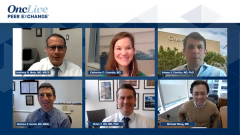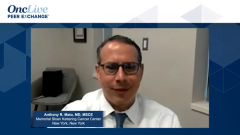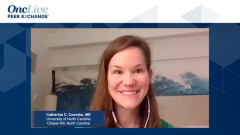
Treatment Decision-making Among Second-generation BTKis in CLL
Key opinion leaders in CLL review factors driving therapeutic decision-making among the available second-generation BTK inhibitors including efficacy and safety considerations.
Episodes in this series

Anthony R. Mato, MD, MSCE: Matt, let's confuse the situation even further. We have the ELEVATE-RR [trial] (NCT02477696) as well, so we have ibrutinib vs zanubrutinib, [and] we have ibrutinib vs acalabrutinib. How do we sort out ELEVATE-RR in the context of the data that Callie just presented?
Matthew S. Davids, MD, MMSc: [It’s] very challenging to compare across studies. Of course, it's tempting to try to use that common comparator of ibrutinib to try to compare acalabrutinib with zanubrutinib, but there are a few differences between the studies that Callie noted. Some of them [are] around the end points, but also there [are also] differences in the patient population. The acalabrutinib study focused higher-risk populations, either with deletion 17p [(del(17p)] or del(11q). I think the main difference that makes it challenging to compare even the toxicities is the length of follow-up, which was a median of about 40 months on ELEVATE-RR, much shorter still on [the] ALPINE [study] (NCT03734016). Even though the rates of atrial fibrillation look very low with zanubrutinib right now, we know that atrial fibrillation is somewhat of an accumulated toxicity. Those rates are likely to go up over time, so I think we need more time to really be able to compare the 2 studies.
Anthony R. Mato, MD, MSCE: Brian, I want to ask you a question about selection of BTKs (Bruton tyrosine kinase) inhibitors. Maybe you can try to extrapolate what Callie and Matt just talked about to the frontline setting as well. How do we choose? How are we supposed to make this decision?
Brian T. Hill, MD, PhD: For CLL (chronic lymphocytic leukemia), I think you really have very strong head-to-head evidence that acalabrutinib is at least as effective and safer than ibrutinib, so that tends to be where the field has moved for frontline and relapsed treatment. Zanubrutinib data is very compelling. I think a lot of us just want to see a little more follow-up. Sometimes some of the AEs (adverse events) creep up over time, but barring any severe headache or drug-drug interaction with a PPI (proton pump inhibitor), I think most people do very well with acalabrutinib.
Anthony R. Mato, MD, MSCE: I want to throw this question to Alexey. I always want to give him the controversial questions. We’ve already heard about the head-to-head data for zanubrutinib vs ibrutinib. Let's say another year goes by, and those PFS (progression-free survival) curves remain separate from one another. Does that mandate a change in the standard of care, in your opinion?
Alexey V. Danilov, MD, PhD: Well, that surely is a controversial question.
Anthony R. Mato, MD, MSCE: That's why I asked you.
Alexey V. Danilov, MD, PhD: I think that question [is] really difficult to answer. I think we will have to analyze why the PFS curve separation is occurring. It seems to be that ibrutinib may be somewhat underperforming in that study, and I don't quite understand why as the discontinuation rates seem to still be relatively low. I will say, however, that all of us have switched to second-generation BTK inhibitors and favor acalabrutinib, at least as it is approved, over ibrutinib. I think the field has already been slowly—at a glacial pace—moving in the direction of these drugs over ibrutinib. I think the standard of care is changing already. Looking at all of these studies together, in some, I would probably say that, ultimately [the] use of second-generation BTK inhibitors is preferable to ibrutinib at this stage.
Anthony R. Mato, MD, MSCE: Michael, I want to ask you a quick question. We've gone on and on now about these head-to-head trials in CLL with the covalent inhibitors. Is there any point in repeating the same types of studies in mantle cell lymphoma? Is there anything we can learn there that you think would be worth doing, or are we beyond that at this point, with the exception of the pirtobrutinib randomized study?
Michael Wang, MD: I think we are beyond that. In my opinion, they were not going to do it in mantle cell lymphoma because of the time that it requires. It [takes] a long time [to do] all that. One thing I have to emphasize is that we cannot use data from Waldenstrom macroglobulinemia and CLL in mantle cell lymphoma. Let me give you a simple example. Hypertension was higher in the experimental group [with] ibrutinib in both Waldenstrom macroglobulinemia and CLL. But with respect to hypertension in [the] SHINE [clinical trial] (NCT01776840), there's no difference between the 2 arms. We cannot borrow toxicity from 1 trial to another, and we cannot borrow data from 1 trial into a different dataset. We need to be cautious about that.
Anthony R. Mato, MD, MSCE: We've heard hypertension brought up a few times now, but I've been arguing for a while, and I think many other people would agree, that this is one of the BTK inhibitor-associated toxicities that, when we're using them as a continuous therapy long term, has the most risk for patients. Matt, any comment on whatever little data we have about hypertension inducing other cardiovascular or neurological events in patients with CLL that's attributable to the BTK inhibitors?
Matthew S. Davids, MD, MMSc: I agree. I think it's a very real risk. I think one of the unique aspects of hypertension—and this is probably best characterized with ibrutinib—is that it is a risk that continues beyond the first year or 2. You see hypertension popping up in longer-term follow-up of patients [after] 4, 5, or 6 years on ibrutinib. The cardiovascular risks are real. This can lead to increased risks of stroke, MI (myocardial infarction), and other cardiovascular complications, so it is something I watch closely in my patients on ibrutinib. In the past, I've been aggressive about blood pressure control and antihypertensives. If a patient's struggling with hypertension on ibrutinib, I’m now more inclined to switch them to acalabrutinib, where we know the risk of hypertension is less.
Anthony R. Mato, MD, MSCE: Does that actually work? If you have a severely hypertensive patient on ibrutinib, they're on 2 and 3 drugs, [and] you switch them to acalabrutinib, for example, does that change their blood pressure profile?
Matthew S. Davids, MD, MMSc: Yes, it's worked anecdotally, in my experience. We have prospective trial data from Kerry A. Rogers, MD, at The Ohio State University Comprehensive Cancer Center and others suggesting that it's an effective strategy to switch from ibrutinib to acalabrutinib specifically for hypertension.
Anthony R. Mato, MD, MSCE: Great. That's helpful.
Transcript has been edited for clarity.







































